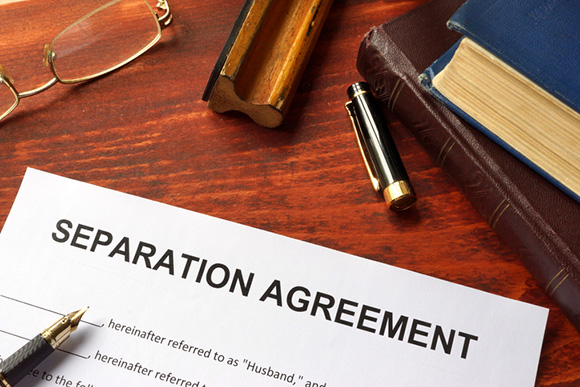Legal separation in Nevada is a formal legal process that decides many of the issues of a divorce without officially granting a divorce. You might wonder what legal separation is in Nevada and whether it’s right for you.
Depending on your specific details, legal separation may be the right option for you. You will want to consult an experienced Las Vegas family law attorney to determine the best choice for your individual circumstances. Here’s what you need to know about legal separation in Nevada.

Legal separation in Nevada is a legal proceeding that decides most of the things that get resolved in a divorce without actually declaring a divorce. A legal separation is a lot like a divorce, but the most significant difference is that there’s no judgment of divorce and no end of the marriage status.
Separation allows the parties to live independently and it determines each spouse’s legal rights and obligations without granting a judgment of divorce. Nevada Revised Statutes 125.190 through 125.270 lists the laws in Nevada for legal separation.
Either spouse can ask for a legal separation under Nevada law. The grounds for legal separation under Nevada law are the same as the grounds for divorce.
Nevada is a no-fault state for divorce, and incompatibility is the most common grounds for divorce. Either spouse may ask for a legal separation on the grounds of incompatibility.
A legal separation decides most of the same issues of a divorce. The court can award possession of real property like the marital home. They can award personal property like vehicles.
The court can determine child custody and a parenting schedule. Child support and spousal support are other key considerations during a legal separation. The court can establish ownership of financial accounts and other assets of the parties. Any issue that might get decided during a divorce is open for division during a legal separation except the court can’t grant a judgment of divorce.
An order for legal separation is an enforceable court order. Even if the terms of the legal separation order are unfair or unreasonable, the court can enforce its order. That makes it critical to take the legal separation proceeding seriously.
If you don’t file a response in the court within the time limit, you may lose the ability to participate in the case. Then, you may be surprised to find yourself with a custody and child support order that doesn’t reflect the best interests of the children. You might be surprised to see that you’re ordered out of the marital home or that you lose other assets that you may have been granted if only you had participated in the case. It’s critical to participate in the legal separation proceedings to make your voice heard and ask the court to issue a separation order that’s reasonable, fair and in the best interests of the children.

Another reason that it’s important to take the separation proceedings seriously is that many couples who legally separate go on to get divorced. The judgment of divorce often mirrors the legal separation order. Now is the time to ask the court for what you’re looking for in the event that you ultimately get divorced. If you don’t address the court and ask for the things you’re looking for now, you may lose your chance. It’s critical to treat the proceedings as seriously as you would treat a divorce proceeding.
A legal separation is a financial separation. With the exception of spousal and child support payments, you’re each responsible for your own income, investments, and debts after the separation is final. After the separation, you’re no longer liable for your spouse’s debts. If they incur debts after your separation, you’re not liable to pay those debts. On the other hand, if your spouse acquires assets or their assets appreciate, you do not have any claim to them.
Spousal support is largely the same in a divorce and a legal separation proceeding. The court looks at the same factors in both types of proceedings when they decide whether to award spousal support and how much to award. But one thing to keep in mind is that spouses are legally obligated to support each other.
If you retain married status by getting separated instead of divorced, the court may be more inclined to award spousal support or more prone to award spousal support in a higher amount or duration than they might award in a divorce under similar circumstances. It’s important to meet with a family law attorney to determine what the court might order in your case.
If you have a prenuptial agreement, it applies to a separation as well as divorce. If the prenuptial agreement is enforceable under Nevada law, the court must apply it to the legal separation proceedings. A prenuptial agreement may affect property division, spousal support payments, and the award of attorney fees.
Moving out without legal proceedings doesn’t come with separate legal status. You’re still liable for the financial choices of your spouse. You also have no right to an enforceable custody order or an order of support.
There are pros and cons to each course of action. A legal separation allows you to retain your spouse’s health benefits or survivor benefits for social security or the military. It also preserves the marriage relationship for religious reasons or gives you time to work on your relationship.
On the other hand, a divorce allows you to remarry and gives you a sense of finality. In the end, most people choose divorce over legal separation, but it’s important to make the decision that’s best for you. A lawyer can help you review your options to make the best decisions for you.